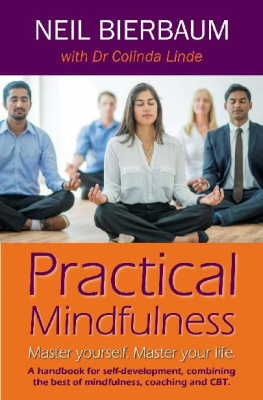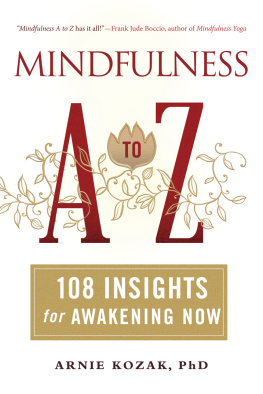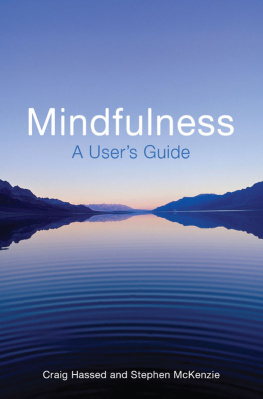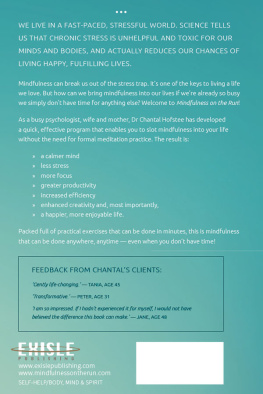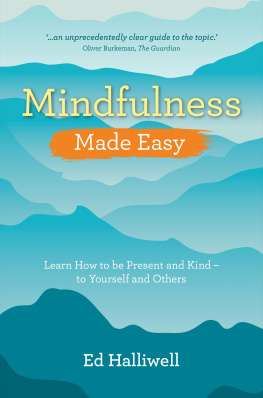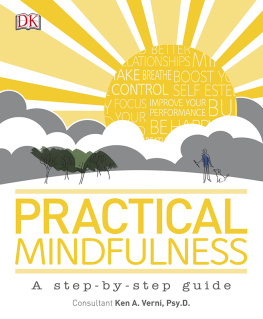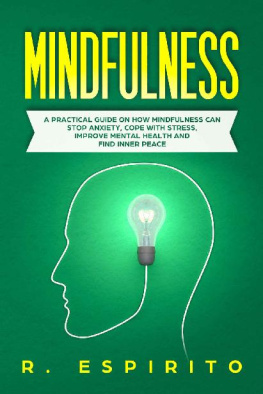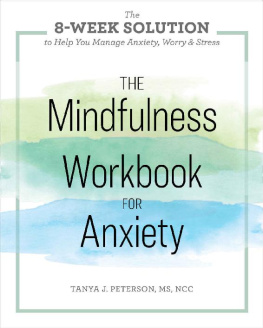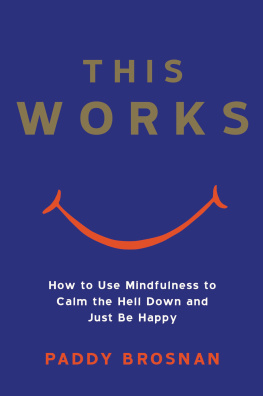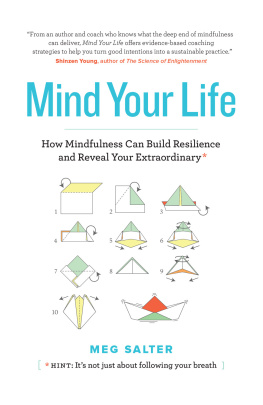T HE PRACTICAL Mindfulness program was born out of a conversation that Neil and I had about how beneficial mindfulness and meditation has been for both of us. We both agreed that it had helped us, firstly, on a daily basis, with all that life in our colourful countrySouth Africatends to throw at a person. It also enabled us to navigate calmly and rationally through various upheavals in our lives. We both wondered how anyone gets by without it.
This gave us the idea of bringing mindfulness to everyone, in a practical way that could be used immediately. Out of the conversations that followed, the live workshop series took shape. We chose the key elements of mindfulness based on our years of reading and experience. Then we selected the main areas of life, or fields of application, where weve experienced its benefits for ourselves and many of our clients over the years. Our underlying goal was always to share something useful and beneficial, so that others could experience life differently as well.
Weve run the programme several times nowmore than 250 people have attendedand received knockout feedback about its benefits. Neil's take-home notes for each module proved even more popular and the request for a book came up more than once. Neil needed little promptinghes not only an accomplished meditator but also an award-winning writer, and so he leapt into the task. After months of additional research, writing and editing of his own work, with some proofing and checking from me, youre about to benefit from that output.
I have to say, too, that watching Neil create this book felt a lot like observing a master craftsman. I think of a watchmaker, who has a single-pointed focus as every component is carefully placed, layer upon layer, connection point to connection point, until a fully functioning precision instrument is born. This book will take you through a similar processyour own balanced mind being the end goal. Every word has been deliberately chosen and placed, as has the evolution of each chapter from the component parts that have come before.
And just as a bespoke watch needing a service or repair returns to the craftsman, this book can be taken along with you as a lifetime resource.
SECTION A | Introduction
A S THE name suggests, this book will provide you with a practical path to develop personal masteryand thereby improve your experience of lifeby applying the principles and practices of mindfulness. These principles and practices go much further than just calming you down in order to deal with stress, or turning you into a better corporate Energizer bunny.
Most people will agree that the world is a pretty topsy-turvy place at the moment. Election results are unexpected. Terrorist attacks are unpredictable. New companies can scale to global proportions in astonishingly short periods of time, while historical giants whether they be companies, government dictators, or celebrities can crash to zero within weeks.
In truth, the world has always been a topsy-turvy place. As Winston Churchill said, History is just one damn thing after another. The difference now is the pace of change and the degree of unpredictability. Even personal anchors, like having a steady career and a lifelong marriage, are fast becoming the exception rather than the norm.
The net effect of this is that the old reference points no longer apply. We can no longer be guided by firm, fixed and clear religious and social norms. The trust that people once placed in their leaders has been massively eroded. Who do we turn to? We have to figure it out for ourselves.
Mindfulness is capable of providing an important anchor. Yeah, right, you might say. Mindfulness is just a bunch of hippy crap thats been packaged for the social media age. Or you may have a more positive view of mindfulness, but see it as merely a good way to deal with stress. Much like yoga, or Pilates.
That may be fair comment, and were here to say that mindfulness is also much more. We like to say its the salt in the mix. In the way salt brings out the flavours in a dish, we say that mindfulness, applied correctly, can raise individualand, ultimately, collectivehuman consciousness.
Thats a pretty lofty claim. To stay with the analogy we used, what can we say about salt? It brings up the other flavours of the dish. Have you heard the story of the king, the three sons and the salt? The king sends his three sons out on a mission to find something of the greatest value. The two eldest sons return with a jewel of sorts; the youngest son returns with a small bag of salt. The king is insulted and banishes him to the kitchen, and throws a banquet for the other two sons. Well, guess who wins when he withholds the salt from the food at the banquet and the king is embarrassed?!
What the king discovers about salt is that its only needed in tiny proportions to make a big difference. One more thing we should recognise about salt is that its incredibly abundant on earth, but not in its isolated form. For the most part, it has to be distilled from water.
Mindfulness is about becoming aware of the nature of ones mind and using that awareness to consciously direct ones mind, rather than be directed by it. As anyone who has practiced mindfulness will know, the mind is fairly unruly. We can say that the mind has a mind of its own, and we have little control over it. Yet we allow this out-of-control mind to run our lives and direct our way in the world.
For people who claim to be rational, thats not very rational. Its a bit like being at the steering wheel of a bus, but having no direct connection to the wheels. The wheels do their own thing. This is dangerous, because the mind is naturally reactive, which means that people are naturally reactive.
The consequences of this are obvious, and all around us in broad daylight. Political polarisation is perhaps the prime example. Its becoming so prevalentfuelled by the trolling that social media makes possiblethat the beer brand Heineken actually attempted to address the theme through its advertising.
Despite all our scientific knowledge and technology, were apparently not improving our ability to manage our differences at the same rate as were developing things like artificial intelligence. In fact, we can say that what we humans have is a kind of artificial intelligencean intelligence that lacks awareness, mindfulness, wisdom.
As the global leader of Vipassana meditation, S N Goenka, says, No wonder theres so much of madness in the world!
Fortunately, some sanity has prevailed, and science has been used to produce something other than weapons or other forms of competitive advantage: some scientists have shown that certain forms of meditation can actually change the brain. Seasoned Vipassana meditators grew more physical connections between the amygdala (which controls the fight-or-flight response) and the prefrontal cortex (which controls reason). These people proved to be much less reactivetheir brains recovered much more quickly from a fight-or-flight responsethan non-meditators.
In our bus-driving analogy, this is like connecting the steering wheel to the wheels. Things feel a whole lot safer and in control that wayfor you and for other peopleand thats what mindfulness can do for your own life and, ultimately, for society.
When you practice mindfulnessand this book will show you howyou distil your own essential point of awareness from the sea of thinking and feeling that will have hitherto dominated and run your life. That tiny measure of awareness, like a tiny measure of salt, can infuse and transform your life.

